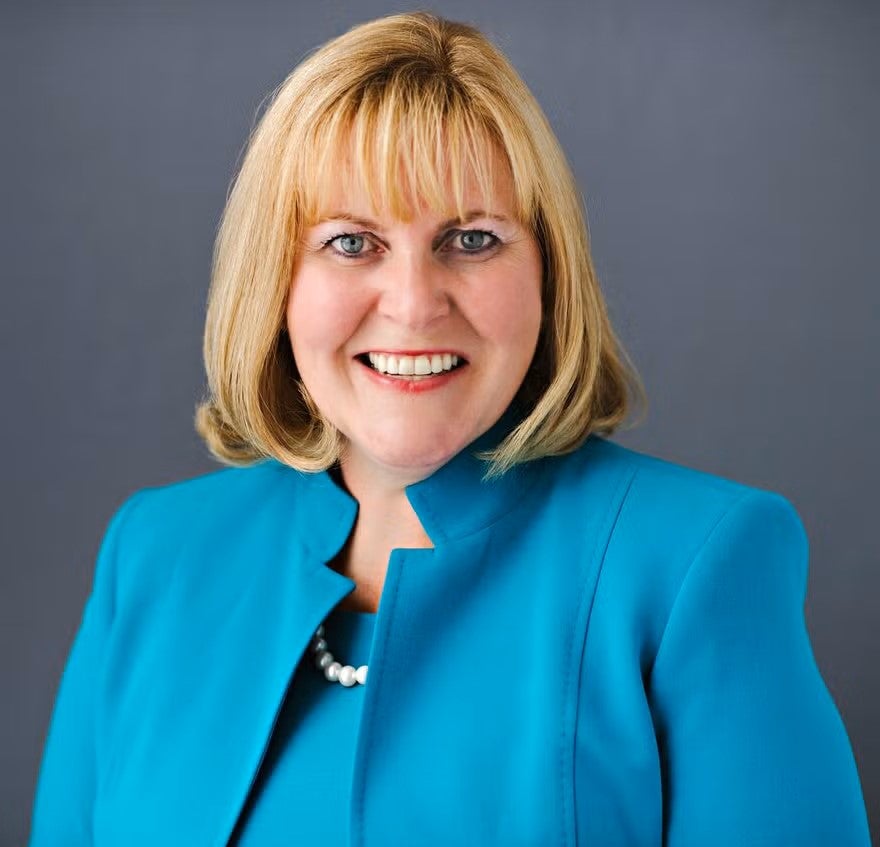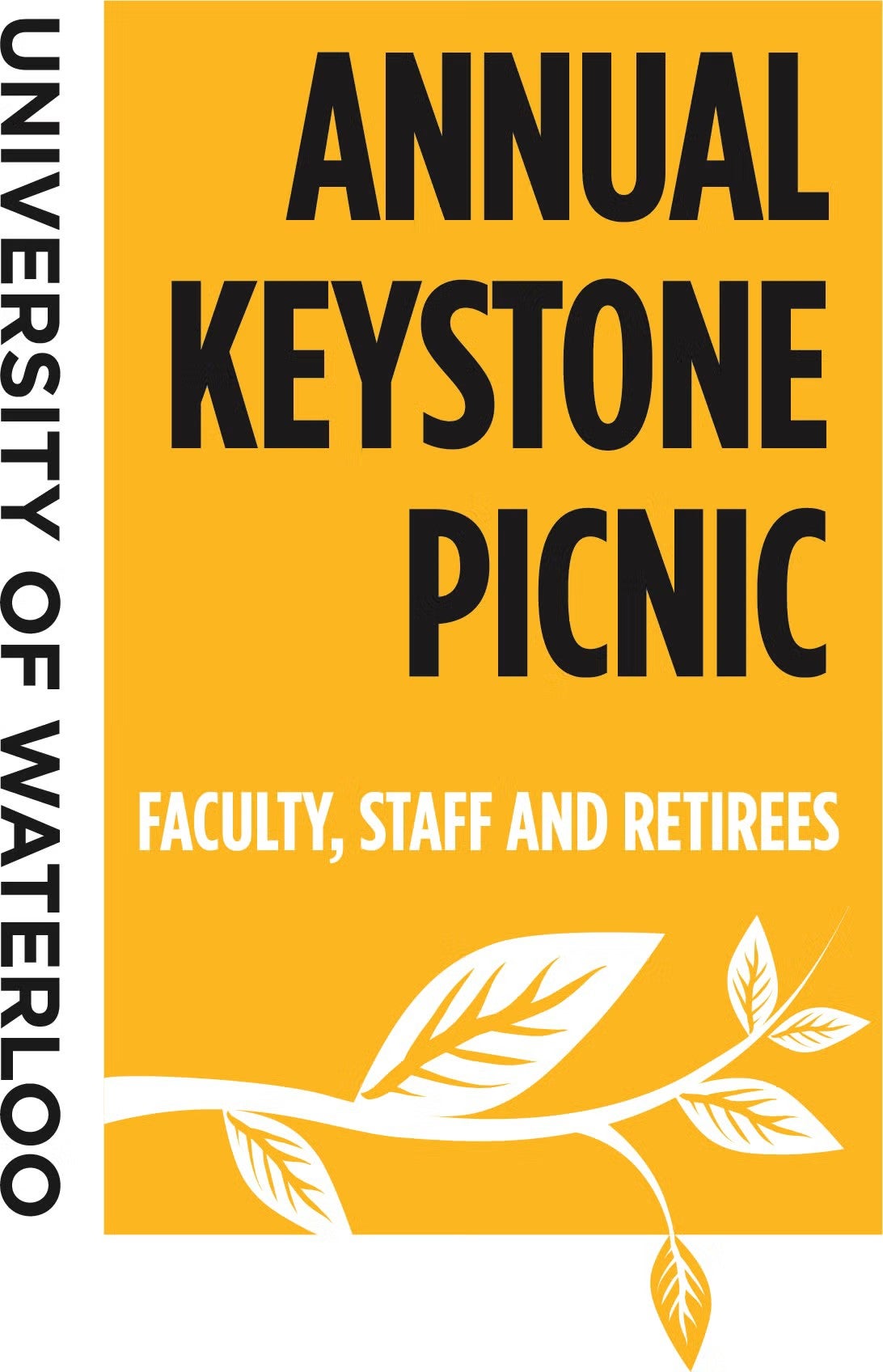Editor:
Brandon Sweet
University Communications
bulletin@uwaterloo.ca
Susan Tighe appointed as McMaster University's Provost

Susan Tighe, Waterloo’s deputy provost and associate vice-president, integrated planning and budgeting, has been appointed as provost and vice-president, academic at McMaster University, effective July 1, 2020.
The appointment was unanimously approved by McMaster’s Senate and Board of Governors this week and announced yesterday.
“I share this news with mixed emotions as Professor Tighe has been a valued member of the University for more than 20 years and has elevated the important role of Deputy Provost in the last three years,” wrote James Rush, vice-president, academic & provost in a memo circulated to Executive Council yesterday.
A Waterloo alumnus with a MASc in Civil Engineering (’97) and a PhD in Civil Engineering (’00), Tighe has been a faculty member in Civil and Environmental Engineering since January 2000 and is the Norman McLeod Chair in Sustainable Pavement Engineering. During her time at Waterloo, she has been involved in numerous departmental, faculty and University-level initiatives.
As a faculty member, Professor Tighe has gained national and international recognition for her outstanding contributions to the development, design, and management of sustainable concrete and asphalt transportation infrastructure. Susan is a founding member of the Centre for Pavement and Transportation Technology (CPATT) at the University. Prior to assuming the CPATT’s director role, which she held from 2010 to 2017, she served as the Associate Director of Research and Technology from 2005 to 2010. She is a past Canada Research Chair in Pavement and Infrastructure Management. She has successfully completed over 80 graduate students since starting at the University in 2000, many of whom are now in academic, public and private sector leadership positions. In 2017, Susan received the University of Waterloo Graduate Supervision Award.
Most recently, Professor Tighe has served as the Deputy Provost and Associate Vice-President since July 2017, and has been instrumental to the development and implementation of the Waterloo Budget Model and University-wide space planning activities and has advanced communication on important issues amongst key stakeholders across the University.
Professor Tighe’s reputation as a scholar, educator, and professional engineer is well illustrated by the breadth of her honours and awards including Canada’s Top 40 Under 40, New College of Scholars, Royal Society of Canada, Fellow, Canadian Academy of Engineering, Fellow, Canadian Society for Civil Engineering and the Ontario Society of Professional Engineers Medal for Research and Development. She has also received academic Fellowships including the Erskine Fellowship at the University of Canterbury in New Zealand, the U.K. Royal Academy of Engineering University of Nottingham in England and the Queensland Pavement Center located at University of the Sunshine Coast Australia.
Professor Tighe will retain an adjunct appointment in the Department of Civil and Environmental Engineering so that she can maintain research collaborations at CPATT.
“Please join me in congratulating Professor Susan Tighe on this new opportunity in her academic and administrative career,” the provost writes, noting that further communications regarding covering the Deputy Provost on an interim basis as well as finding a successor will be sent out in the coming weeks.
Math alumni seek to celebrate and inspire the class of 2020

By Robin Morden. This article originally appeared on Waterloo Stories.
This isn’t how the Faculty of Math’s class of 2020 envisioned their graduating year. Instead of walking across the convocation stage to receive their diploma in front of family and friends, students will participate in a virtual ceremony. Then, in the months ahead, these same graduates will seek work in one of the toughest job markets in recent memory.
But there is cause for hope and optimism.
Without diminishing the challenges facing today’s students, the Faculty of Math’s incoming Dean Mark Giesbrecht sees Waterloo graduates playing a key role in articulating what the post-pandemic world will look like.
“These are challenging times, but they are also times that are going to define the future,” Giesbrecht says. “The world is changing and our students’ education in technology and rigorous thinking is going to serve them well. They have the opportunity to think deeply, not just how we can get through the pandemic, but about how we can use the pandemic as an impetus to improve the way we work and live.”
Giesbrecht will be celebrating this year’s graduates and fielding questions at the Alumni Day & Virtual Celebration of the Math Class of 2020 event on Friday, June 5. He will be joined by other University faculty members and prominent Math alumni, including Sam Pasupalak (BCS ’12), co-founder of Maluuba, Dave McKay (BMath ’87, DMath ’18), CEO of RBC, Rudy Karson (BMath ’79), managing partner at Karlani Capital, and Larry Smith, director of Waterloo’s Problem Lab. They will participate in panel discussions on a variety of topics, including “how to achieve success in the face of a recession” and “thriving in your career.”
Alumni tell stories of hardship, offer tips for navigating a recession
Michelle Hung (BMath ’08), author and founder of The Sassy Investor, hopes that by participating as a panelist in Friday’s virtual event, she can help graduates remain resilient and hopeful in the face of adversity.
Like this year’s graduating class, Michelle entered the job market in the midst of the financial crisis of 2007. She still vividly recalls how discouraged and anxious she felt as she struggled to find work.
“I remember being super ambitious and excited to get my career started — but then things weren’t happening the way I planned,” Hung says. “Nobody was hiring. I was frustrated and felt like I was falling behind my peers. I thought I would never get a job in investment banking ever again, even though I completed two co-op terms in that industry.”
She wants to remind today’s students that the crisis is temporary and not to beat themselves up if things don’t go their way initially. Hung stayed patient in her job search and after a year of looking she found a good position on Bay Street. It was the start of a highly successful career, first as an investment banker and then as an author and entrepreneur.
Hung also advises students that the recession could also be a good time to diversify your skillset.
“Things change and to be adaptable is one of the best traits to possess,” Hung says. “Use the time to gain other skills, get creative and most importantly, enjoy your youth.”
Hung will be telling her story and sharing more tips for navigating the recession as part of the “My Crossroad Moment” panel at 10 a.m. on Friday, June 5.
Ian McPhee, co-founder of WATCOM, Waterloo’s first spin-off software company, also confronted a recession upon his graduation in 1973.
“Few companies were hiring and I had no contacts,” Ian recalls. “My wife had just given birth. I only got one job interview at Systemhouse and drove to Ottawa during a blizzard for it.”
The interview went badly. McPhee recalls being a nervous wreck throughout it and did not get hired. But this may have been a blessing in disguise, as it led to the opportunity that would change his life. He took a low-paying, but opportunity-rich, job working with Wes Graham’s legendary Computer Systems Group (CSG), where he worked as a student. Paul Dirksen taught him how to enhance WATFIV and later Ian helped develop compilers for several languages on mainframe and minicomputers systems under contract to IBM and Digital Equipment. When it became evident that microcomputers were going to become powerful enough for real computing, he co-founded WATCOM with Wes Graham.
McPhee believes that many of today’s graduates could follow his lead and become entrepreneurs.
“The opportunities and help for startups in Waterloo have never been better, with Velocity, the Accelerator Centre, Communitech, etc. I’m expecting some of today’s grads will become leaders of some very exciting enterprises in time that begin now as humble startups,” McPhee says. “Every disaster presents opportunities and those who find and act on them can be very successful.”
McPhee looks forward to participating in lively discussions all day on Friday.
Looking ahead
While the event celebrates the 2020 graduating class, it also seeks to raise support for our current students, many of whom are struggling to find work. Organizers are asking that Waterloo alumni make introductions between organizations and Waterloo’s Co-operative Education and Experiential Education (CEE) office.
Currently, there is unprecedented funding available to employers of students. Up to 75 per cent of a student wage may be subsidized, and non-profits may be eligible for complete funding. The CEE office is hoping to add 2000 jobs in the next three weeks to ensure that all students seeking to complete co-op term this Spring have work-terms.
Members of the class of 2020, parents and math alumni can register for the Alumni Day & Virtual Celebration of the Math Class of 2020 and participate on Zoom. Other students or members of the Waterloo community who are interested in watching the proceedings can do so on Facebook live.
Sharon McKay-Todd retiring from Waterloo after 18 years
A message from the Office of Advancement.
When did you start working at Waterloo?
I came in 2002 when Campaign Waterloo: Building a Talent Trust was in its quiet phase and the Office of Development and Alumni Affairs (now the Office of Advancement) needed someone to lead the Planned Giving program.
What did you do in the role?
I’ve spent my entire 18-year tenure in Planned Giving, developing relationships with alumni, faculty, staff, retirees, parents and friends of the university – essentially anyone who is interested in leaving a bequest or other future gift such as life insurance to the university. I also manage these gifts once they are received, as well as gifts made in memory or in honour of someone special.
What do you like best about it?
Meeting with our donors, hearing their stories, their successes and what motivates them to be so incredibly generous to the university.
What is your fondest memory of your time at Waterloo?
I have so many, but essentially, I’ve had the most rewarding job in the world. I got to meet the kindest people you can imagine — people who are sharing the benefits of their life’s work with the Waterloo students of today and tomorrow.
What will you miss most about Waterloo?
The incredibly devoted teams I work with in Advancement, and, of course, the students.
What are your plans for retirement?
Well, I did have plans that included getting on a plane, and I’m hopeful that can still happen down the road. In the meantime, I’m just going to enjoy an unstructured life. That will take some getting used to, but I’ll manage.
All are invited to a virtual retirement celebration (via Zoom) on June 12 at 1 pm. You can join in here. Sharon’s last day with Waterloo is July 31.
A message about Keystone Picnic 2020
A note from the 2020 Keystone Picnic Committee.

Today marks what would have been the 19th annual Keystone picnic, and though we wish we were enjoying a barbecue lunch together, that’s not possible right now. Still, we hope you take some time today to relax over the lunch hour, enjoy the sunshine and connect with colleagues virtually.
The picnic has always been an opportunity for us to recognize and thank our faculty, staff and retirees who support the university through charitable gifts. So we would be remiss not to take a moment to say thank you to all of our fabulous Keystone supporters who contributed over $2 million to Waterloo this past year.
Stay healthy and safe!
Beyond the Bulletin Episode 47

The latest episode of the Beyond the Bulletin Podcast is now live. Mikal Skuterud, a labour economist and professor from the Department of Economics, shares what’s behind some staggering numbers from Canada’s labour market and what we can expect in the future. The University condemns racism and commits to do more to support the campus community and advocate for change. Spring convocation goes virtual. And Jennifer Clapp, a professor from the Faculty of Environment, wins a Killam fellowship.
Link of the day
When and Where to get support
Students can visit the Student Success Office online for supports including academic development, international student resources, leadership development, exchange and study abroad, and opportunities to get involved.
Award from GSEF-GSA-GSPA for thesis-based master’s and PhD students who have lost funding because of COVID-19. Visit https://uwaterloo.ca/gspa/covid-19-updates-graduate-students for more details.
Instructors can visit the Keep Learning website to get support on adapting their teaching and learning plans for an online environment. The following workshops are current offerings from the KL team (CTE, CEL, ITMS, LIB):
Teaching Online: Basic Skills for TAs, June 1 to 30.
Teaching Online: Advanced Skills for TAs, June 1 to 30.
Deepening Your Course Design: Remote Edition, Monday, June 15, 1:30 p.m.
Google Translate – a tool for cheating or a tool for learning? Wednesday, June 17, 2:00 p.m.
Employees can access resources to help them work remotely, including managing University records and privacy of personal information
Interested in learning more about engaging your students in an online course? The Centre for Extended Learning has created a new resource for you called "Fostering Engagement: Facilitating Online Courses in Higher Education"
ThisOpen Educational Resource was designed for post-secondary instructors and teaching assistants who would like to better understand the critical role of facilitation in online course delivery, and build practical skills and strategies that are relevant, effective, and authentic.
Here are some tips for staying healthy while working from home.
The Writing and Communication Centre has gone virtual to provide assistance.
Grad Writing Cafés and #WaterlooWrites, self-registration on LEARN:
- Tuesdays: 9:00 a.m. to 12:00 p.m.
- Wednesdays: 2:00 p.m. to 4:30 p.m.
- Fridays: 9:00 a.m. to 12:00 p.m.
Virtual Drop-In Appointments, Tuesday, May 19 to Thursday, August 6, registration on WCONLINE
- Sunday - Thursday from 6:00 to 9:00 p.m.
- Sign up begins at 5:55 p.m.
- Closed for the holidays on July 1 and August 3
- Appointments are 25 minutes long
We understand that these circumstances can be troubling, and you may need to speak with someone for emotional support. Good2Talk is a post-secondary student helpline based in Ontario, Canada that is available to all students.
If you feel overwhelmed or anxious and need to talk to somebody, please contact the University’s Campus Wellness services, either Health Services or Counselling Services.
The Library has published a resource guide on how to avoid information overload.
The Faculty Association of the University of Waterloo (FAUW) continues to advocate for its members. Check out the FAUW blog for more information.
The University of Waterloo Staff Association (UWSA) continues to advocate for its members. Check out the UWSA blog for more information.
WUSA supports for students:
Food Support Service food hampers are currently available from the Turnkey Desk on weekdays from 9:00 a.m. to 4:00 p.m. in the Student Life Centre. If you have any questions please email us at foodsupport@wusa.ca.
MATES – Providing general online Peer Support via Skype to undergraduate students. To set up an appointment, please contact mates@wusa.ca
Empower Me is a confidential mental health and wellness service that connects students with qualified counsellors 24/7. They can be reached at 1-844-741-6389.
Glow Centre - Providing online Peer Support for the LGBTQ2+ community via Skype to Undergraduate students. To set up an appointment, please contact glow@wusa.ca
The Women’s Centre – Providing online Peer Support via Skype to undergraduate students. To set up an appointment, please contact womenscentre@wusa.ca
RAISE – Providing online Peer Support via Skype to undergraduate students. To set up an appointment, please contact raise@wusa.ca.
Centre for Academic Policy Support - CAPS is here to assist Waterloo undergraduates throughout their experience in navigating academic policy in the instances of filing petitions, grievances and appeals. Please contact them at caps@wusa.ca . More information at http://wusa.ca/caps
WUSA Commissioners who can help in a variety of areas that students may be experiencing during this time:
- Equity – equity@wusa.ca
- Co-op and Experiential Affairs – coop.affairs@wusa.ca
WUSA Student Legal Protection Program - Seeking legal counsel can be intimidating, especially if it’s your first time facing a legal issue. The legal assistance helpline provides quick access to legal advice in any area of law, including criminal. Just call 1-833-202-4571.
When and Where (but mostly when)
The Workplace Yoga Program is live-streaming classes on Tuesdays and Wednesdays from 12:05 p.m. to 12:50 p.m. in April and May.
Problem Lab pitch competition applications open, May 11 to June 7.
Warriors Coaching Clinics. Every Wednesday from June 3 to July 15. Free online sessions highlighting a wide range of topics featuring Warriors Coaches and staff. Register in advance for the zoom link.
IT Seminar: Working Remotely Efficiently and Securely, Friday June 5, 9:00 a.m. to 9:45 a.m. Join online
Aptly Outspoken Collective presents "Racial Grief and the Need for Black Body Acknowledgements" Sunday, June 7, 6:00 p.m. Register to join the discussion.
Concept $5K Applications Open, Monday, June 8.
Human Rights, Equity and Inclusion seminar, Policy 42 & You, Lunch and Learn on Policy 42: the Sexual Violence Prevention and Response Policy and Procedures, Tuesday, June 9, 12:00 noon to 1:00 p.m.
Science Innovation Hub Skills Development Workshop: Understanding a Paper, Wednesday, June 10, 3:00 p.m.
Conrad School of Business and Entrepreneurship presents “Meet the MBETs Information Sessions – Part-time MBETs,” Wednesday, June 10, 6:00 p.m. to 7:00 p.m.
Concept Intro Session: Validation Exploration, Wednesday, June 10, 6:30 p.m.
Human Rights, Equity and Inclusion seminar, Managing Difficult Conversations, Thursday, June 11, 9:00 a.m. to 12 noon.
The Post-COVID-19 Reboot, “Rebooting with Research: Tackling real-world problems” (panel session 4 of 6) Thursday, June 11, 1:00 p.m.
Virtual retirement celebration for Sharon McKay-Todd, Friday, June 12, 1:00 p.m.
Co-op Problem Award tuition scholarship application deadline, Sunday, June 14.
